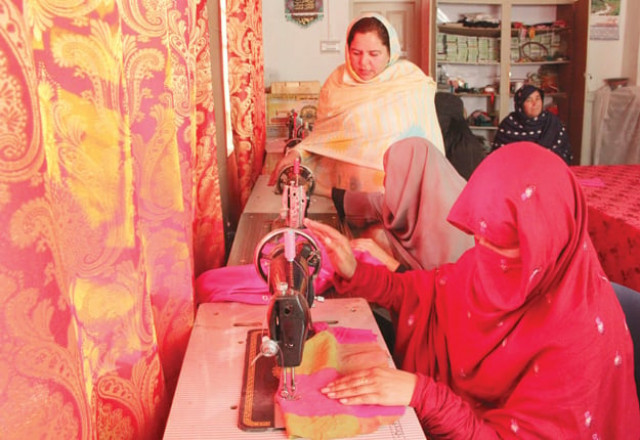Govt urged to ensure same wage for same work
Speakers at awareness seminar say govt should enforce labour laws

Speakers at awareness seminar say govt should enforce labour laws. PHOTO: FAZAL KHALIQ/EXPRESS
HomeNet Pakistan had arranged the event titled: Awareness-raising and policy advocacy on women’s rights and labour laws for women workers. It was funded by the USAID under Aurat Foundation’s Gender Equity Programme (GEP).
HomeNet Pakistan’s Programme Manager Babar Raza said that the GEP had been launched to address issues faced by workers.
He said that the government had adopted the Punjab Fair Representation of Women Bill 2014 to amend certain laws to ensure 33 per cent representation for women in the decision-making bodies. “Similarly, 5 per cent women labour inspectors have been recruited in the factories after a resolution was moved in this regard by some parliamentarians,” he said. Activist Mehnaz Rafi said that women’s rights had received little attention so far in Pakistan.
Sumera Saleem, the Grant Holder from Aurat Foundation, said that the initiative was aimed at increasing women’s access to justice, empowerment of women at home and at workplace, combating gender-based violence and building capacities of civil society organisations (CSOs) that were working for women’s rights.
“The GEP aims at closing the gender gap in Pakistan by proactively supporting the development of women. The programme seeks to facilitate behavioural change in society by enabling women to access information, resources and institutions, and improve societal attitudes towards women’s rights. GEP’s main focus is to empower women for eradication of gender-based violence and capacity building of civil society organisations at grassroots level. The GEP has awarded 153 sub-grants,” she said.
Javed Pasha, the HomeNet Pakistan senior programme officer, read out the charter of demands for securing the rights of home-based workers. The main demands were: adopt the official international statistical definition of home-based workers in national labour surveys and censuses or other national data collection systems; ensure that national labour force surveys include a question on place of work; promote efforts to measure home-based workers’ contribution to the local economy (cities and villages) as well as national economy and exports; standardising social security issues; ratify International Labour Organisation (ILO) conventions 189 and 177; make home-based workers a priority within poverty reduction and women’s empowerment initiatives; translate all labour laws in local languages, especially in Urdu; register workers with social security and health insurance schemes, Workers Welfare Board and Baitul Maal; and ensure training of women in entrepreneurship.
Published in The Express Tribune, September 1st, 2015.



















COMMENTS
Comments are moderated and generally will be posted if they are on-topic and not abusive.
For more information, please see our Comments FAQ